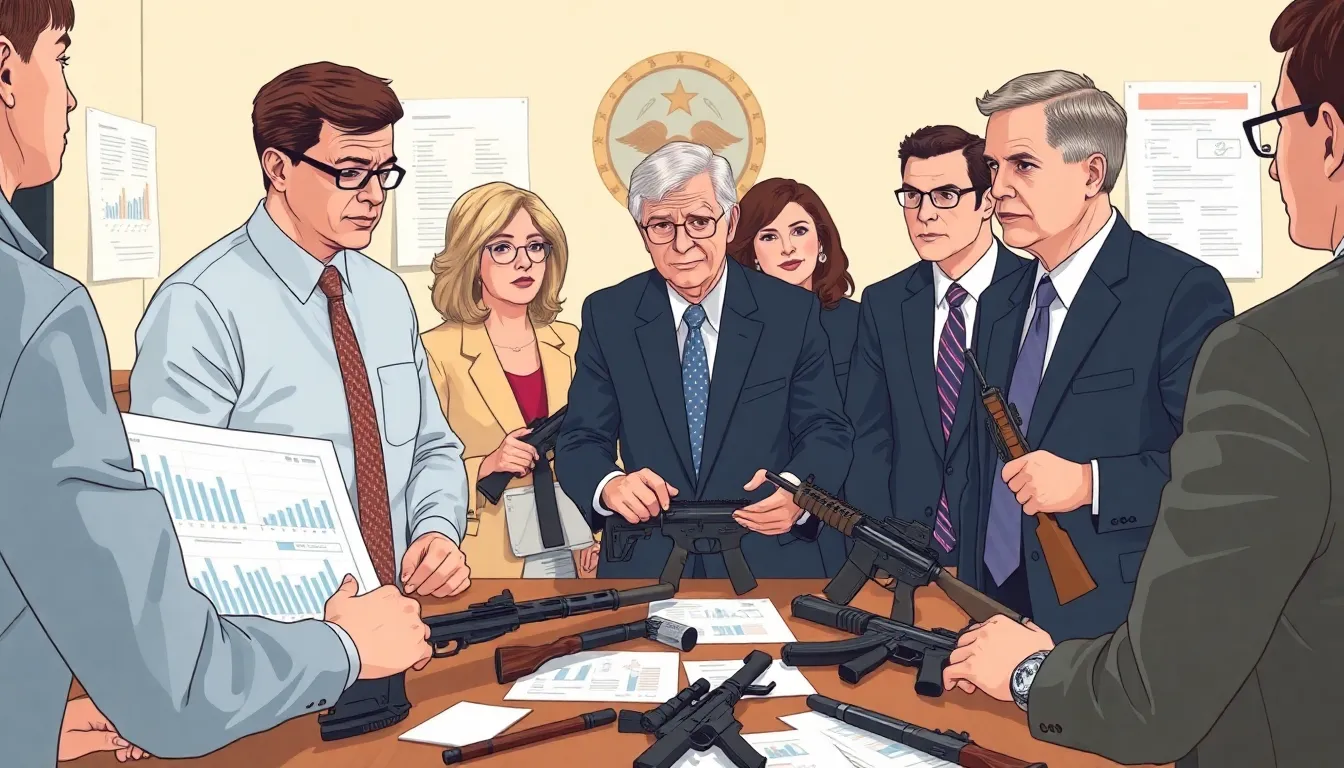Table of Contents
ToggleAs the winds of change sweep across Illinois, the latest updates on the assault weapons ban have everyone talking. Picture this: lawmakers huddled in a room, armed with nothing but their pens and a strong cup of coffee, debating how to balance safety and rights. It’s a scene straight out of a political drama, but the stakes are all too real.
With the clock ticking, residents are eager to understand how these developments could impact their lives. Will the ban bring peace of mind or stir up a hornet’s nest? Buckle up, because this rollercoaster ride through legislation is just getting started. Stay tuned as we break down what’s happening, why it matters, and how it could change the landscape of gun ownership in the Land of Lincoln.
Overview of the Illinois Assault Weapons Ban Update
The Illinois Assault Weapons Ban remains a focal point of legislative discussions. Recent developments indicate that lawmakers propose stricter regulations aimed at specific firearm types. Following a surge in gun violence, the state government seeks to enhance public safety through this ban. Recently, Governor J.B. Pritzker underscored the necessity of these measures, emphasizing their potential to save lives.
Several key provisions are under consideration. A notable aspect includes defining what constitutes an assault weapon. Lawmakers focus on semi-automatic firearms, particularly those with certain features such as detachable magazines and rapid-fire capabilities. Communities across Illinois express varied opinions, fostering a dynamic dialogue about the balance between public safety and individual rights.
Stakeholders, including gun owners and advocacy groups, actively participate in this debate. Advocacy groups like the Illinois Council Against Handgun Violence champion the ban, citing studies linking assault weapons to increased fatalities. In contrast, organizations such as the NRA highlight the importance of Second Amendment rights and self-defense. Representing both sides, public forums serve as platforms for expressing diverse viewpoints.
The timeline for implementing these updates remains uncertain. As debates unfold, amendments may reshape the ban’s final form. Continued discussions among lawmakers signify that adjustments are likely before any legislation passes into law. The evolving situation reflects ongoing societal concerns around gun control, ensuring that policymakers remain attentive to community feedback as the process advances.
Key Changes in Legislation

Recent discussions in Illinois reveal significant changes in the assault weapons ban legislation. Lawmakers are actively defining what constitutes an assault weapon, leading to notable alterations in existing laws.
Definition of Assault Weapons
The legislative proposal focuses on specific firearm characteristics. Semiautomatic firearms with detachable magazines and rapid-fire capabilities fall under the definition of assault weapons. Additional features such as pistol grips and adjustable stocks also categorize firearms as assault weapons. Understanding these definitions aids in clarifying which firearms face restrictions.
Restrictions and Provisions
Proposed restrictions target the sale and possession of defined assault weapons. Possession of these firearms may face limitations for current owners, creating a potential buyback program. Additionally, modifications to existing firearms could be restricted, limiting features that enhance firing rates. Specific community input shapes local variations in how provisions may be enacted, enhancing the local governance aspect of the ban. Overall, these provisions reflect lawmakers’ commitment to improving public safety amid rising concerns about gun violence.
Legal Challenges and Controversies
Ongoing legal battles surround Illinois’ assault weapons ban, reflecting the complexity of this issue.
Court Cases Involving the Ban
Multiple lawsuits challenge the legality of the assault weapons ban in Illinois. Legal arguments often cite Second Amendment rights as central to the disputes. Cases have emerged in various jurisdictions, with judges assessing the constitutionality of the proposed restrictions. Some plaintiffs include gun owners and advocacy groups who assert that the ban infringes upon their rights. Recent court decisions indicate mixed outcomes, suggesting that further developments are likely in the coming months. The attention on these cases emphasizes the critical nature of this legislation and its implications for long-term gun regulation in the state.
Public Reaction and Advocacy
Public opinion remains divided regarding the assault weapons ban in Illinois. Advocacy groups play a significant role in shaping this dialogue. Organizations such as the Illinois Council Against Handgun Violence strongly support the ban, emphasizing the need for stricter gun control measures. Conversely, the NRA and similar groups emphasize individual freedoms and argue against perceived overreach. Residents express a wide array of views, often grounded in personal experiences with gun violence. Community meetings and rallies serve as platforms for various sides to voice their concerns, illustrating the ongoing debate over public safety and personal rights.
Impact on Gun Owners and Law Enforcement
The Illinois assault weapons ban significantly affects both gun owners and law enforcement. Compliance with new regulations remains a primary concern.
Compliance Requirements for Gun Owners
Gun owners must adapt to upcoming compliance requirements outlined in the ban. Registration of assault weapons might be necessary, ensuring that owners document their firearms accordingly. Restrictions on the sale or transfer of specific models will apply, impacting current ownership. Reporting any modifications to existing firearms becomes crucial, as alterations may lead to legal issues. Awareness of deadlines for compliance submissions will determine how smoothly owners transition under the new law. Failure to comply may result in penalties, emphasizing the need for vigilance among firearms owners.
Role of Law Enforcement in Enforcement
Law enforcement agencies play a pivotal role in enforcing the assault weapons ban. Officers will receive training on the specifics of the legislation, allowing them to identify compliant and non-compliant firearms effectively. Cooperation with local communities enhances enforcement efforts while fostering trust between law enforcement and residents. Officers will conduct regular checks and implement initiatives to educate and inform gun owners about the new regulations. Legal consequences for violations will fall under their jurisdiction, necessitating a clear understanding of the law among all law enforcement personnel. Public safety remains a priority, driving law enforcement’s commitment to upholding the new rules.
Future Implications and Considerations
Future developments surrounding the Illinois assault weapons ban present significant implications for gun ownership and public safety. Lawmakers will continue to refine the definition of assault weapons, impacting what firearms residents can own. Adopting stricter regulations might limit access to specific models widely used by law-abiding citizens.
Compliance with new laws is essential for gun owners to avoid penalties. Transition periods may grant time for owners to adjust, but awareness of deadlines ensures adherence. Law enforcement agencies face the challenge of enforcing these regulations, demanding effective training for officers. Accurate identification of compliant weapons will be crucial in maintaining order.
Community reactions remain mixed, necessitating continued dialogue among stakeholders. Outreach efforts from lawmakers could enhance understanding and acceptance of proposed changes. Advocacy groups, such as the Illinois Council Against Handgun Violence, play a key role in shaping public opinion and rallying support for stricter measures.
Legal battles may also influence the trajectory of the assault weapons ban. Court decisions might lead to amendments, reshaping the final legislation based on judicial guidance. Ongoing legal challenges highlight the tension between regulatory measures and Constitutionally protected rights.
Collaboration between community leaders and law enforcement stands vital for successful implementation. Clear communication and educational initiatives could equip residents with necessary information about changes and compliance requirements. Addressing concerns will foster trust, enabling smoother enforcement of new regulations.
Engagement with diverse community perspectives promotes a holistic approach to balancing safety and rights. The evolving landscape surrounding the assault weapons ban will require vigilance and adaptability from all involved parties.
The debate over the Illinois assault weapons ban continues to evolve as lawmakers navigate the complex intersection of public safety and individual rights. With proposed regulations targeting specific firearm features and ownership restrictions, the landscape for gun owners is shifting.
As discussions unfold, community engagement remains crucial for fostering understanding and acceptance of potential changes. Legal challenges are likely to shape the final form of the legislation, making it essential for stakeholders to stay informed and involved.
Moving forward, collaboration between lawmakers, law enforcement, and community members will play a pivotal role in ensuring the effective implementation of new regulations while addressing the diverse perspectives surrounding this contentious issue.





